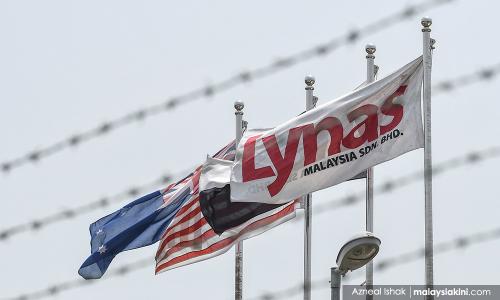Is it worth having Lynas in Malaysia?
LETTER | Is it worth having Lynas in Malaysia? According to one of the chief defenders of the rare earth refinery, Mohd Redzuan Md Yusof – of flying car fame – Lynas’ investment was “too big to ignore”.
It is unfortunate then that a minister, catapulted into power by the people, is so willing to prostitute the health and safety of Malaysians in the name of profit.
For Redzuan, nothing is sacred – he is even willing to bring in the race card to defend Lynas, stating that there is “already significant Bumiputera participation in rare earth processing through Lynas, where more than 90 percent of the staff are Malays”.
Even Prime Minister Dr Mahathir Mohamad is fiercely defensive towards the continued operation of the facility.
Despite increased public outcry, Mahathir dismissed the concerns about Lynas – going as far to compare it to the Chernobyl disaster of 1989.
Suddenly, it seems everything is at risk when it comes to Lynas, from good relations with Australia and Japan, the billions in supposed new investments, and the bumiputera agenda.
Unfortunately, isn’t the first time that Malaysia – nor Mahathir – has faced a problem with radioactive rare earth.
The Asia Rare Earth Sdn Bhd (ARE, a company owned by Mitsubishi Chemicals) incident in Bukit Merah during the 1980s which involved rare earth and radioactive waste is surprisingly rarely mentioned.
The aftereffects of the ARE facility are still felt today, despite over RM300 million spent cleaning up its waste. It is estimated that Bukit Merah community will have one case of leukemia every three years as a result of radioactivity.
So why is Lynas so important for the Pakatan Harapan government? Environmental concerns notwithstanding, the Lynas plant plays a crucial role in the global rare earths supply chain – an important resource for everyday electronics such as smartphones and lightbulbs.
With China possessing a near-monopoly on global rare earth processing capacity, one might assume that Mahathir is attempting to raise Malaysia’s international standing.
Japan, which is one of the world’s key importers of rare earth materials, is not only a major financial backer of Lynas (given the recent announcement that Lynas would supply Japan 7,200 tons of rare earths a year until 2038) but is also seen as being actively involved in lobbying for the corporation.
Surely it cannot be pure coincidence that Mahathir gave his unconditional support for Lynas to continue to operate in Malaysia during a recent visit to Tokyo?
But I for one think that this is not worth the 50,000 to 70,000 lives that may be affected if any environmental catastrophe occurs at the Lynas facility.
Aside from serving as a chess piece in the game of global powers, what actual benefits does this facility provide the government?
Will foreign governments suddenly see Malaysia as a key player in global politics, just because we are willing to let foreign countries store waste that even the most developed countries refuse to take up?
If we are really serious about foreign investment, surely there are better initiatives that are worth considering? How about Iskandar Malaysia and Forest City?
Its economic benefits are also considerable, and at least does not deal with toxic waste. There is a significant presence of foreign companies, with Singapore being the largest investor in Iskandar Malaysia followed by the United States, Spain, Japan and China.
It also potentially will serve as a key growth region for the state, and through Forest City, it already provides jobs for over 1350 local families and is set to provide more than 220,000 job opportunities in 2035.
The government cannot afford to compromise on the issue of toxic waste. This is the chance for the government to prove that it can put vested interests aside for the sake of the health and safety of the Malaysian people.
There is no need for another Pasir Gudang.
The views expressed here are those of the author/contributor and do not necessarily represent the views of Malaysiakini.
RM12.50 / month
- Unlimited access to award-winning journalism
- Comment and share your opinions on all our articles
- Gift interesting stories to your friends
- Tax deductable
